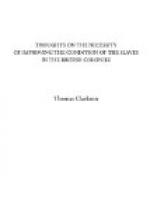It will be said, lastly, that all the four cases put together prove nothing. They can give us nothing like a positive assurance, that the Negro slaves in our colonies would pass through the ordeal of emancipation without danger to their masters or the community at large. Certainly not. Nor if these instances had been far more numerous than they are, could they, in this world of accidents, have given us a moral certainty of this. They afford us however a hope, that emancipation is practicable without danger: for will any one pretend to say, that we should have had as much reason for entertaining such a hope, if no such instances had occurred; or that we should not have had reason to despair, if four such experiments had been made, and if they had all failed? They afford us again ground for believing, that there is a peculiar softness, and plasticity, and pliability in the African character. This softness may be collected almost every where from the Travels of Mr. Mungo Park, and has been noticed by other writers, who have contrasted it with the unbending ferocity of the North American Indians and other tribes. But if this be a feature in the African character, we may account for the uniformity of the conduct of those Africans, who were liberated on the several occasions above mentioned, or for their yielding so uniformly to the impressions, which had been given them by their superiors, after they had been made free; and, if this be so, why should not our colonial slaves, if emancipated, conduct themselves




